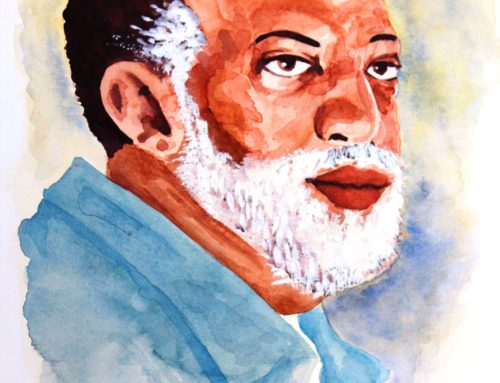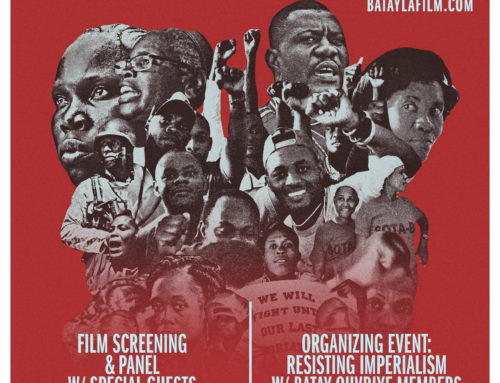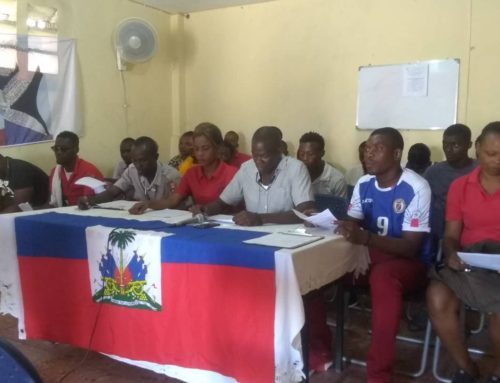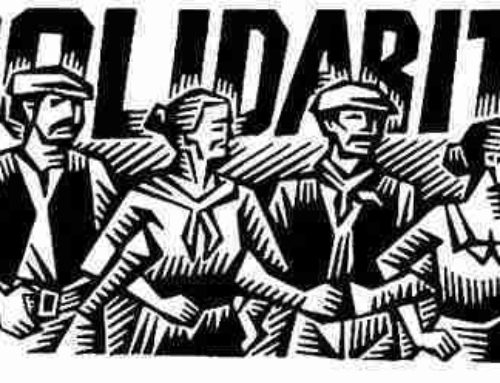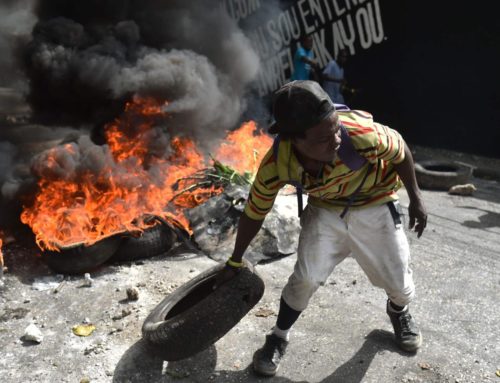Workers in Haiti struggle militantly, using strike actions to force employers to negotiate!
___
UPDATE on the Struggle in Subcontractor Factories
A report from Batay Ouvriye
April 2015
This is an assessment of the general situation in the subcontracting sector, particularly in the Apaid group and the Korean factories such as DKDR.
Workers in the subcontracting sector, particularly in the Apaid group and the Korean factories such as DKDR, are going through a terrible situation whereby unionized workers are forbidden to speak to other workers in the plants. The right to unionize does not exist in those plants. Unionized workers are forbidden from answering phone calls on the floor even in the case of home emergencies. They are forbidden to use the air tube on the floor to dust themselves off after work. When unionized workers are caught doing any of the above, they are summoned to human resources for disciplinary action such as a letter of reprimand and suspension for eight (8) days. If the workers contest the disciplinary measures, they are summoned to appear at the regional office of the Ministry of Social Affairs and Labor. Before leaving the premises, the bosses take photos of them and display these on a wall as if they were thieves. Supervisors are tasked to spy on unionized workers. As soon as other workers are seen talking to them, the supervisors tell them to keep moving. Otherwise, they are ready to send those workers to human resources for disciplinary action.
In the context of these problems, the union representatives are always there to defend the workers despite threats, intimidation and character assassination as common practices done against them. For every minor incident, the bosses summon union members to the Ministry of Social Affairs and Labor (MAST). The union leaders are always there to accompany the workers to stave off illegal and arbitrary disciplinary measures according to Article 163 of the Labor Code.
They cut off the workers’ health insurance at the Bernard Mews Hospital. They refuse to give chairs to the workers who are working on sleeves. Furthermore, in the Apaid group, particularly at GMC, workers are being asked to sign a contract without any clarity on whether their contract expired or whether it is simply a modification. If the contract has expired, then they have to pay the workers severance and rehire them. This is the problem at GMC between management and a union called SINOTHAG. There have been many work stoppages to demand an explanation. GMC bosses fired ten executive board members of the union last week on the pretext that their actions were illegal.
At the Korean factories, particularly at DKDR, last December, management stole half of the yearly bonuses of the workers by calculating the bonus on the basis of 2010 minimum wage of 150 gourdes ($3.19 per day) when in fact the calculations should have been based on 2014 minimum wage of 300 gourdes ($6.38 per day). Management was deducting money from workers’ wages each month for the state run pension plan, but instead pocketed their money and never sent anything to the National Office of Insurance (ONA) on behalf of the workers’ pension. For these reasons, the workers were angry and organized a strike campaign. At DKDR, the workers rose up on March 5, 2015 to press management to pay their back wages stolen from them last December and also the refund of the pension money management deducted from their wages for ONA without ever sending it to ONA.
What were the struggles? What were the results?
The union representatives at Premium and the workers launched a strike campaign against all the repressive actions on unionized workers, namely:
1. Management displaying workers’ photos on plant walls as an intimidation and/or humiliation tactic
2. Anti-union practices
3. Violations of established procedures on labor conflicts between management, the state and the unions in the subcontracting sector
4. Arbitrary dismissals
5. Health insurance at the Bernard Mews Hospital
6. Refusal to give chairs to workers who work on sleeves
7. Denial of the right to receive phone calls even in emergency situations
8. Denial of the right to use the air tube on the floor after work
9. Refusal of management to negotiate the 300 gourdes retroactive pay
At Premium, the workers mobilized against such practices with a warning strike, which lasted one hour. As workers participated massively in the warning strike, negotiations started in the presence of the Labor Mediator and representatives from May First Union Federation (ESPM-BO),Better Work, and the SOTA-BO section in the factory. Shortly after the start of the negotiations, a big delegation from the Ministry of Social Affairs and Labor came. The discussions allowed the union to achieve a lot of its demands from management, hard-nosed Clifford Apaid. He agreed that his team and he made some serious mistakes that they will not repeat.
They said they agree to work with the union to improve the situation, namely,
1) allow the union to function freely and to provide training for their supervisors
2) Premium management will work with the union on a plan of action within 15 days on the disciplinary procedures in order to solve the problem of going to the Ministry of Social Affairs and Labor for each every little incident and also resolve the issue of arbitrary dismissals.
3) They promised to call OFATMA to come and create a Health ID card for each worker, and their wife or husband and three children.
4) They promise to provide chairs within a week for the workers who sew sleeves.
5) No agreement has been reached on the question of receiving calls on the floor. The union will make a proposal to management on circumstances that telephone can be used.
6) On the question of the air tube, MAST asserted that it’s a hazard, and encouraged management to provide shower facilities so workers may clean themselves; meanwhile MAST will conduct a study on the air tube.
7) The negotiations allowed us to set up a meeting to discuss the agreement on the 300 gourdes question on Thursday April 23, 2015; however, more discussions are needed on the agreement.
At GMC, after the strike action, negotiations started but did not result in an agreement. The Union leadership notified MAST about a strike action on April 16, 2015; all the workers participated in that strike action. Negotiations started again in the presence of Better Work, MAST, the Labor Mediator to try to reach an agreement. A meeting was set up for Monday April 20, 2015 to continue with the negotiations.
On Saturday April 18, one of the union leaders, Yves Lamondry, needed permission for something and the supervisor refused to grant it. So he went to human resources where he saw the HR director and exclaimed, “Oh I am saved; here comes the director!” To which the director responded, “I wanted to see you too.” With both of them inside the office, the director locked the door and pulled out his gun, and people in the office tackled our comrade. Our comrade was totally astonished, didn’t know what was happening. He did what he had to do to break out of the of human resources office, get to the floor, and explain to some workers what just happened to him in the office. Word got around pretty quickly, angering all the GMC workers, who stopped work immediately.
Management made several attempts to calm things down to no avail, until the other entities arrived for the negotiations and then an agreement was reached to pay the workers for Saturday and their two-week pay. The workers were to get paid on Saturday and return to work on Monday as usual. However, when they got in front of the gate on Monday, they saw a notice on a wall that said there was no work for the day but would be on Tuesday, and only authorized workers will be allowed to work. Workers’ anger flamed up once again.
They went to the Justice of the Peace to get a judge to come and make a report. The demonstration did not stop there; they went before the regional office of MAST. This is where they discovered a dismissal letter from management saying that the 10 members of the executive board of the union were fired. Since then, management has used various means to intimidate workers, use police officers to terrorize workers, stop their protests. They have some non-union workers use other gates to get access inside the factory to work. The situation remains all the more complicated for two weeks at GMC. Management stands steadfast on their positions.
As far as DKDR, the strike action of the workers against the violations and abuse the Korean management perpetrated against them in the factories, brought about the intervention of delegates from the union, Better Work, MAST and the Labor Mediator. These negotiations forced management at DKDR to begin to pay back the money stolen from workers. He guaranteed he would pay to the National Office of Insurance (ONA) all the pension monies he deducted from the workers’ wages, by June 2015.

